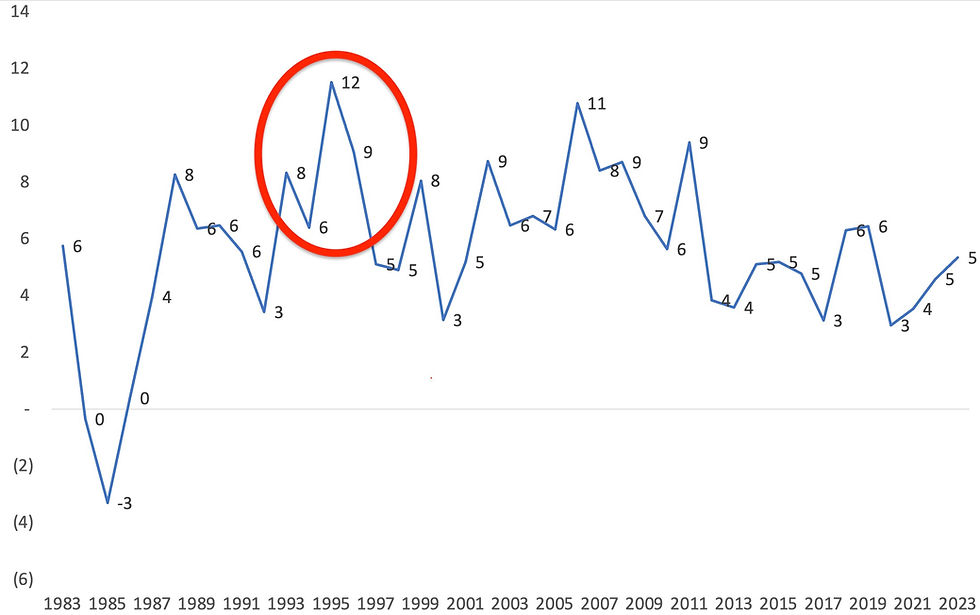Zohran, Sweetie Pie & Uganda
- Jan Dehn

- Jun 12, 2025
- 6 min read
Updated: Jun 14, 2025

A poll conducted by Public Policy Polling on 6-7 June 2025 showed that Zohran Mamdani is now leading Andrew Cuomo in the race to become the next mayor of New York City. The election will take place on 4 November 2025.
I have never met Zohran Mamdani, but his sudden rise to political prominence nevertheless fills me with excitement. It is not just that he is a new generation of Democrat, which the party sorely needs in order to take on Trump and his fascists; it is also that I have a pleasant and personal, albeit indirect connection to Zohran from a very happy time on a continent very, very far away.
Allow me to explain.
Rewind to 1994. After completing my master’s degree in economics, I landed a job as economic advisor in Uganda’s Ministry of Finance & Economic Development (MFED). The posting, which was arranged through the ODI Fellowship Scheme changed my life. I am particularly grateful to Tony Addison, professor at Copenhagen University, for encouraging me to apply for the job.
I worked for two years in Uganda, or two ‘budget cycles’ as finance ministry types are prone to saying. The experience was profoundly educational, changing me for the better professionally and as a person.
I was a civil servant rather than an aid worker, so I gained genuinely unique insights into the political economy of this cash strapped, fragile, aid-dependent yet dynamic African economy. I was later able to put this knowledge to good use in my doctorate and in my subsequent career as an emerging markets investor.
The timing of my posting to Uganda from 1994 to 1996 was fortuitous. While political developments in Uganda have since taken a negative turn as President Yoweri Museveni has become increasingly authoritarian and the country has turned against homosexuals, the spirit in the mid-1990s was very different.
Museveni had defeated former president Milton Obote in a bloody civil war in 1986, putting an end to the nightmare years of 1971-1986 in which Idi Amin and Milton Obote killed hundreds of thousands of Ugandans.
By the mid-1990s, the Ugandan economy was growing 9% per annum on average in real terms. Peace had returned to most parts of the country and living conditions were improving for Ugandans across the board.

During his first decade in power, Museveni had something genuinely novel, innovative, and constructive to offer the country. Among his most important achievements was the restoration of democracy, albeit of a kind designed to prevent Uganda from back-sliding into politics along ethnic-linguistic lines. Museveni’s innovative solution to the problem of tribal party-politics was to outlaw party affiliations, requiring all candidates standing for parliament to run as individuals. The system has since become corrupted, but at the time it was exactly what Uganda needed.
Museveni was also quick to realise the importance of returning the war-ravaged economy to growth. He ditched the socialist lessons he had learned at the University of Dar es Salaam in favour of highly pragmatic market-based reforms.
Three sets reforms in particular stood out. First, he restored macroeconomic stability and liberalised the foreign exchange market. Second, he got rid of corrupt and loss-making parastatals, which freed up resources to invest in infrastructure and make primary education free for everyone. Third, he dissolved the state coffee monopsony. By enabling farmers to sell their coffee freely at market prices, Museveni reduced poverty in Uganda by a third.
Museveni’s progressive attitude made it professionally rewarding to work in the MFED, which soon emerged as the main incubator of reform ideas. The economic team of which I was a small part was led by Permanent Secretary & Secretary to the Treasury, Emmanuel Tumusiime-Mutebile, who had the president’s trust and was given great freedom to design and enact progressive reforms.

I am proud to have worked for Tumusiime-Mutebile, who was one of the best economists I have ever known. I remember him as a colourblind larger-than-life whiskey-drinking no-nonsense visionary brimming with authority and personal courage. He was cut out for greatness from Day One. In his youth, as leader of the Makerere University student union, he was one of the few Ugandans who dared to speak out publicly against Idi Amin’s confiscation of Asian property. For this courageous act, he was forced to flee the country. During his exile in Britain, Tumusiime-Mutebile studied economics at Balliol College, Oxford. When he returned to Uganda, he quickly rose through the ranks at the MFED.
What, you may ask, does all this have to do with Zohran Mamdani and the mayoral election in New York? Well, until very recently I too would have struggled to answer that question. As recently as two weeks ago, I had never heard of Zohran, nor had I paid much attention to the upcoming mayoral election in New York City.
However, as fate would have it, my friend Ifty pointed out to me on a recent visit to London that Zohran is the son of Professor Mahmood Mamdani and movie producer Mira Nair. Now, those two I have heard about - they were my neighbours in Uganda! I lived in a small bungalow on Buziga Hill south of Kampala. My terrace had beautiful views over Ggaba Beach and Lake Victoria - see picture below. Mahmood and Mira lived in the house opposite mine.

To those unfamiliar with Mahmood and Mira, here is a short synopsis. Mira Nair directed the movie Mississippi Masala, which stars Denzel Washington and explores romantic relationships between African Americans and Indian Americans. Mahmood Mamdani is a respected academic specialising in African and colonial politics, who was actively involved in policy debate during my time in Uganda.
I never got closer to Mahmood Mamdani and Mira Nair than to politely nod at them when our cars passed on the road. I was far more intimate with their dog, which - the epitome of irony - was called Sweetie Pie; to this day Sweetie Pie is the nastiest, most vicious and foul-tempered little cur I have ever known!
Anyway, I enjoyed Mississippi Masala very much and I took an interest in Professor Mahmood Mamdani’s writings, because he happened to be involved in a very lively and passionate public debate with my boss, Tumusiime-Mutebile, over the direction of economic policy in Uganda.
Tumusiime-Mutebile and Mahmood Mamdani had many things in common. Both were bright and engaging men. Both had actively opposed Amin and Obote and been kicked out of Uganda for doing so. Both had been in exile in the UK. Both had taught at the University of Dar es Salaam and both had returned to their country to aid in the recovery. Clearly, both men cared deeply about Uganda.
But that is where their similarities ended. Tumusiime-Mutebile and Mamdani disagreed sharply about how to help Uganda. Mamdani wanted big state-led development, while Tumusiiime-Mutebile was suspicious of big government and wanted the private sector to be the main engine of the Ugandan economy.
Being a young and very committed member of Tumusiime-Mutebile’s team at MFED, I naturally took his side in the debate. Uganda's narrow tax base was and remains a major constraint on government size. Upwards of 40% of government spending is paid for by donor money and Uganda still has no access to international capital markets. Official sector corruption also places a limit on the desirability of big government. In other words, ramping up state spending as Mamdani advocated would have led to an almost instant fiscal crisis. To this day, I am convinced it is for the better that Tumusiime-Mutebile’s approach rather than that of Mahmood Mamdani prevailed.

Mamdani left Uganda for South Africa in 1996 and is now Professor in the Department of Anthropology at Columbia University in New York City. The big man Tumusiime-Mutebile passed away in 2022 after occupying the governor's seat at the Bank of Uganda for more than twenty years.
In running for office in New York, Zohran has clearly opted to carry on his family’s tradition of active policy engagement. I hope he defeats Andrew Cuomo, who is part of the old Democratic Party policy mafia. Like another young and successful New York politician, Alexandria Ocasio-Cortez, Zohran is from the new generation of progressive Democrats. He has the kind of ideas that can make the Democratic Party relevant again.
Which is sorely needed right now.
The End




Comments